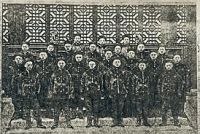Wuchang Uprising
The Wuchang Uprising of Oct. 10, 1911, was a massive armed revolt against local authorities in Wuchang, Hubei Province, by revolutionaries in a modernized army formed by the government. It led to the Revolution of 1911, which overthrew the Qing Dynasty (1644-1911) and feudalist rule, and the establishment of the Republic of China (1911-1949).
The mutiny broke out only after an accidental explosion. Revolutionaries in the Russian concession were building a bomb (Wuchang had a modern military industry and manufactured weapons and other military equipment for the New Army) when one suddenly went off; this led to a police investigation, which uncovered lists of members of the Literary Society, an anti-government group, within the New Army. Facing arrest and execution, the revolutionaries revolted and the army took over the city in less than a day. The local Qing officials fled, and over the next two months, 15 southern provinces seceded in support.
The Qing government’s delayed response gave the revolutionaries enough time to declare a provisional republican government joined by a number of provincial assemblies other than the Manchurian rulers.
